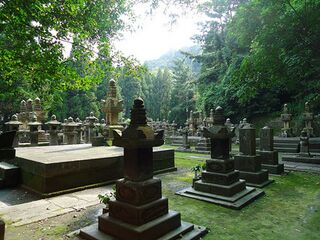Difference between revisions of "Fukusho-ji"
| Line 6: | Line 6: | ||
Fukushô-ji was a [[Soto Zen|Sôtô Zen]] temple in [[Kagoshima]], which served as the family temple (''[[bodaiji]]'') for the [[Shimazu clan]]. Though the temple is no longer in operation, the Shimazu clan cemetery which houses the graves of numerous generations of clan heads continues to be maintained on the site. Gyokuryû Middle School & High School now stands on the former site of the Fukushô-ji temple buildings. | Fukushô-ji was a [[Soto Zen|Sôtô Zen]] temple in [[Kagoshima]], which served as the family temple (''[[bodaiji]]'') for the [[Shimazu clan]]. Though the temple is no longer in operation, the Shimazu clan cemetery which houses the graves of numerous generations of clan heads continues to be maintained on the site. Gyokuryû Middle School & High School now stands on the former site of the Fukushô-ji temple buildings. | ||
| − | The temple was established in [[1394]] when [[Shimazu Motohisa]] invited the [[Zen]] priest [[Sekioku Shinryo|Sekioku Shinryô]] to Kagoshima to establish a ''bodaiji'' for the Shimazu clan. | + | The temple was established in [[1394]] when [[Shimazu Motohisa]] invited the [[Zen]] priest [[Sekioku Shinryo|Sekioku Shinryô]] to Kagoshima to establish a ''bodaiji'' for the Shimazu clan. It later became the head temple for monk registrars (僧録, ''sôroku''), overseeing all the Buddhist monks in southern Kyushu, as well as a ''chokuganjo'', a prayer hall that could be used by the [[Emperor]]. Fukushô-ji branch temples were established in numerous locations across Kyushu, Shikoku, and the [[Chugoku region|Chûgoku region]]. |
Fukushô-ji was abolished in the early [[Meiji period]], as part of the ''[[haibutsu kishaku]]'' anti-Buddhist campaigns of that time. | Fukushô-ji was abolished in the early [[Meiji period]], as part of the ''[[haibutsu kishaku]]'' anti-Buddhist campaigns of that time. | ||
Revision as of 23:51, 18 November 2014
- Established: 1394, Sekioku Shinryô
- Other Names: 玉龍山 (Gyokuryuuzan)
- Japanese: 福昌寺 (Fukushou-ji)
Fukushô-ji was a Sôtô Zen temple in Kagoshima, which served as the family temple (bodaiji) for the Shimazu clan. Though the temple is no longer in operation, the Shimazu clan cemetery which houses the graves of numerous generations of clan heads continues to be maintained on the site. Gyokuryû Middle School & High School now stands on the former site of the Fukushô-ji temple buildings.
The temple was established in 1394 when Shimazu Motohisa invited the Zen priest Sekioku Shinryô to Kagoshima to establish a bodaiji for the Shimazu clan. It later became the head temple for monk registrars (僧録, sôroku), overseeing all the Buddhist monks in southern Kyushu, as well as a chokuganjo, a prayer hall that could be used by the Emperor. Fukushô-ji branch temples were established in numerous locations across Kyushu, Shikoku, and the Chûgoku region.
Fukushô-ji was abolished in the early Meiji period, as part of the haibutsu kishaku anti-Buddhist campaigns of that time.
Selected Burials
- Shimazu Morohisa
- Shimazu Ujihisa, his wife, and a daughter
- Shimazu Motohisa
- Shimazu Hisatoyo
- Shimazu Tadakuni and his wife
- Shimazu Tatsuhisa and his wife
- Shimazu Tadamasa and his wife
- Shimazu Tadaharu
- Shimazu Tadataka
- Shimazu Katsuhisa
- Shimazu Takahisa, his wife, and son Shimazu Toshihisa
- Shimazu Yoshihisa and his two wives
- Shimazu Yoshihiro and his wife
- Shimazu Tadatsune (Iehisa) and his wife
- Shimazu Mitsuhisa and his wife
- Shimazu Tsunataka, two of his wives, his son Shimazu Nabeyasumaru, and one of his daughters
- Shimazu Yoshitaka, his mother, two of his wives, and one of his daughters
- Shimazu Tsugutoyo, his wife Takehime, and his later wives (the mothers of Munenobu and Shigetoshi)
- Shimazu Munenobu
- Shimazu Shigetoshi and his wife
- Shimazu Shigehide, two of his wives, and his daughter Keihime
- Shimazu Narinobu, his mother, and his two wives
- Shimazu Narioki, his mother, his first wife, and his second wife Yura
- Shimazu Nariakira, his wife Eihime, and his sons Shimazu Kikusaburô, Shimazu Tetsumaru, and Shimazu Torajumaru
- Shimazu Hisamitsu
- Shimazu Tadanari
Other Burials
- Shimazu Munehisa (son of Shimazu Sadahisa)
- Shimazu Hisayasu
- Shimazu Tsunahisa (son of Mitsuhisa; father of Tsunataka) and his wife
- Shimazu Narinori (son of Shimazu Tadashige)
References
- Gallery labels, Shôkoshûseikan, Kagoshima.
- Plaques on-site.
